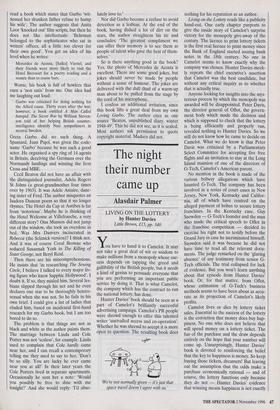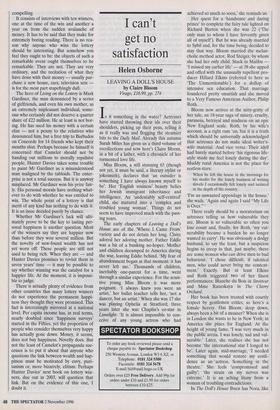The night their number came up
Alasdair Palmer
LIVING ON THE LOTTERY by Hunter Davies Little Brown, £15, pp. 340 Yu have to hand it to Camelot. It may not take a great deal of wit or wisdom to make millions from a monopoly whose suc- cess depends on tapping the greed and gullibility of the British people, but it needs a kind of genius to persuade everyone that you are performing an important public service by doing it. That is what Camelot, the company which has the contract to run the national lottery, has done.
Hunter Davies' book should be seen as a part of Camelot's brilliantly successful advertising campaign. Camelot's PR people were shrewd enough to offer this talented writer 'unrivalled access and co-operation'. Whether he was shrewd to accept it is more open to question. The resulting book does `We're not normally green — it's just that space travel doesn't agree with us.' nothing for his reputation as an author.
Living on the Lottery reads like a publicity hand-out. One early chapter purports to give the inside story of Camelot's surprise victory for the monopoly give-away of the century. The licence to print lottery tickets is the first real licence to print money since the Bank of England started issuing bank notes in the 18th century. No one in Camelot seems to know exactly why the company was chosen. Hunter Davies meek- ly repeats the chief executive's assertion that Camelot was the best candidate, but without any critical inquiry as to whether that is actually true.
Anyone looking for insights into the mys- terious process by which the monopoly was awarded will be disappointed. Peter Davis, the director general of Oflot, the govern- ment body which made the decision and which is supposed to check that the lottery is being efficiently and properly run, revealed nothing to Hunter Davies. So we still do not know how he came to decide on Camelot. What we do know is that Peter Davis was criticised by a Parliamentary Select Committee for accepting five free flights and an invitation to stay at the Long Island mansion of one of the directors of G-Tech, Camelot's American parent.
No mention in the book is made of the various bribery allegations which have haunted G-Tech. The company has been involved in a series of court cases in New Jersey, New York, Kentucky and Califor- nia, all of which have centred on the alleged payment of bribes to secure lottery franchises. In the Kentucky case, Guy Snowden — G-Tech's founder and the man who made the critical speech to Oflot in the franchise competition — decided to exercise his right not to testify before the Grand Jury in case he incriminated himself. Snowden said it was because he did not have time to read all the relevant docu- ments. The judge remarked on the 'glaring absence' of any testimony from senior G- Tech officials. The trial collapsed for lack of evidence. But you won't learn anything about that episode from Hunter Davies' book. Or, for that matter, from Oflot, whose estimation of G-Tech's business methods seems to have been about as accu- rate as its projection of Camelot's likely profits.
Camelot lives or dies by lottery ticket sales. Essential to the success of the lottery is the conviction that money does buy hap- piness. No one who does not believe that will spend money on a lottery ticket. The fun of the purchase and the draw depends entirely on the hope that your number will come up. Unsurprisingly, Hunter Davies' book is devoted to reinforcing the belief that the key to happiness is money. So keep buying those tickets, dreamers! But leaving out the assumption that the odds make a purchase economically rational — and of course, the lottery functions only because they do not — Hunter Davies' evidence that winning means happiness is not exactly compelling.
It consists of interviews with ten winners, one at the time of the win and another a year on from the sudden avalanche of money. It has to be said that they make for extremely boring reading. There is no rea- son why anyone who wins the lottery should be interesting. But somehow you feel they ought to be: the objects of such a remarkable event ought themselves to be remarkable. They are not. They are very ordinary, and the recitation of what they have done with their money — usually pur- chase a new house, cars, television sets is for the most part stupefyingly dull.
The hero of Living on the Lottery is Mark Gardiner, the man denounced by a series of girlfriends, and even his own mother, as an extremely unpleasant individual, some- one who certainly did not deserve a quarter share of £22 million. He at least is not bor- ing. He has used his money with a certain elan — not a penny to the relatives who denounced him, but a free trip to Barbados on Concorde for 14 friends who kept their mouths shut. Perhaps because he himself is concerned that Camelot should not be handing out millions to morally repulsive people, Hunter Davies takes some trouble to paint Mr Gardiner as a misunderstood man maligned by the tabloids. The enter- prise is not a total success. But it is anyway misplaced. Mr Gardiner won his prize fair- ly. His personal morals have nothing what- ever to do with whether he was entitled to win. The whole point of a lottery is that merit of any kind has nothing to do with it. It is an issue decided purely by chance.
Whether Mr Gardiner's luck will ulti- mately prove to be the key to lasting per- sonal happiness is another question. Most of the winners say they are happier now than before they won several million. But the novelty of new-found wealth has not yet worn off. These people are still not used to being rich. When they are — and Hunter Davies promises to revisit them in seven years' time — it may be possible to say whether winning was the catalyst for a happier life. At the moment, it is impossi- ble to judge.
There is actually plenty of evidence from other countries that many lottery winners do not experience the permanent happi- ness they thought they were promised. This fact is interestingly mirrored at a national level. Per capita income has, in real terms, nearly doubled since 'happiness surveys' started in the Fifties, yet the proportion of people who consider themselves very happy has actually gone down. Money, it seems, does not buy happiness. Novelty does. But not the least of Camelot's propaganda suc- cesses is to put it about that anyone who questions the link between wealth and hap- piness must be motivated by envy, puri- tanism or, more bizarrely, elitism. Perhaps Hunter Davies' next book on lottery win- ners, due out in 2003, will question that link. But on the evidence of this one, I doubt it.



















































































 Previous page
Previous page